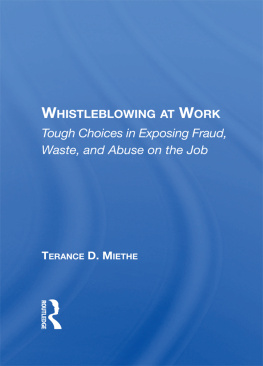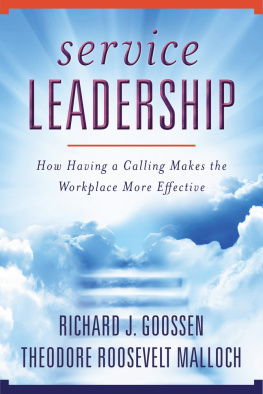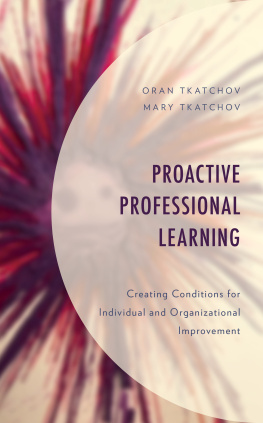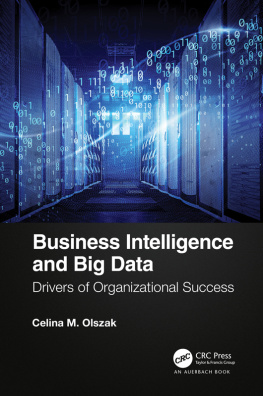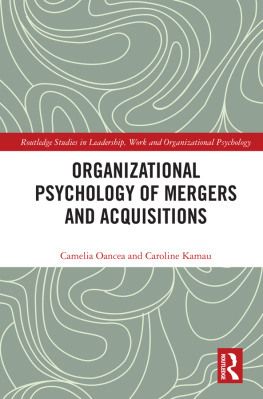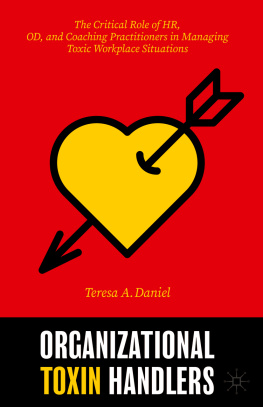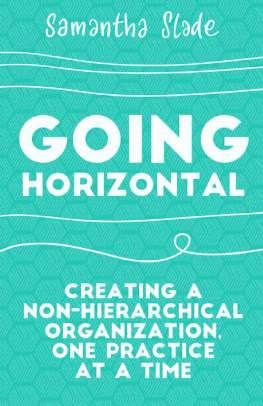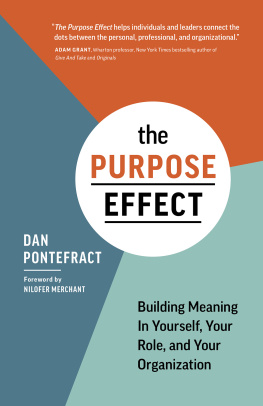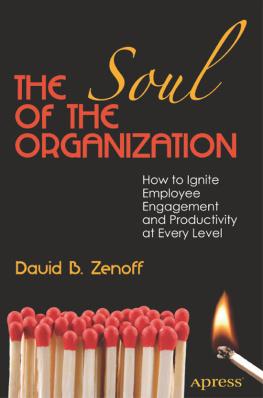WHISTLEBLOWING AT WORK
Crime and Society
Series Editor
John Hagan, University of Toronto
EDITORIAL ADVISORY BOARD
John Braithwaite, Robert j. Bursik, Kathleen Daly, Malcolm M. Feeley, Jack Katz, Martha A. Myers, Robert J. Sampson, and Wesley G. Skogan
Whistleblowing at Work: Tough Choices in Exposing Fraud, Waste, and Abuse on the Job, Terance D. Miethe
Losing Legitimacy: Street Crime and the Decline of Social Institutions in America, Gary LaFree
Casualties of Community Disorder: Women's Careers in Violent Crime, Deborah R. Baskin and Ira B. Sommers
Public Opinion, Crime, and Criminal Justice, Julian V. Roberts and Loretta Stalans
Poverty, Ethnicity, and Violent Crime, James F. Short
Great Pretenders: Pursuits and Careers of Persistent Thieves, Neal Shover
Crime and Public Policy: Putting Theory to Work, edited by Hugh D. Barlow
Control Balance: Toward a General Theory of Deviance, Charles R. Tittle
Rape and Society: Readings on the Problems of Sexual Assault, edited by Patricia Searles and Ronald J. Berger
Whistleblowing at Work
Tough Choices in Exposing Fraud, Waste, and Abuse on the Job
Terance D. Miethe
First published 1999 by Westview Press
Published 2019 by Routledge
52 Vanderbilt Avenue, New York, NY 10017
2 Park Square, Milton Park, Abingdon, Oxon OX14 4RN
Routledge is an imprint of the Taylor & Francis Group, an informa business
Copyright 1999 Taylor & Francis
All rights reserved. No part of this book may be reprinted or reproduced or utilised in any form or by any electronic, mechanical, or other means, now known or hereafter invented, including photocopying and recording, or in any information storage or retrieval system, without permission in writing from the publishers.
Notice:
Product or corporate names may be trademarks or registered trademarks, and are used only for identification and explanation without intent to infringe.
Library of Congress Cataloging-in-Publication Data
Miethe, Terance D.
Whistleblowing at work: tough choices in exposing fraud, waste,
and abuse on the job / by Terance D. Miethe.
p. cm. (Crime and society)
Includes bibliographical references and index.
ISBN 0-8133-3549-3 (hc.)
1. Whistleblowing. 2. WhistleblowingUnited StatesCase
studies. 3. Administrative agenciesCorrupt practicesUnited
StatesCase studies. 4. CorporationsCorrupt practicesUnited
StatesCase studies. I. Title. II. Series: Crime & society
(Boulder, Colo.)
HD60.5.U5M54 1999
331.2dc21 98-43034
CIP
ISBN 13: 978-0-367-21.343-5 (hbk)
- B & W Brown and Williamson Tobacco Company
- CCSD Clark County Public School District
- CEO chief executive officer
- CHAMPUS Civilian Health and Medical Program of the Uniform Services
- CSRA Civil Service Reform Act
- DBE Disadvantaged Business Enterprise
- DFR Duty of Fair Representation
- DOD Department of Defense
- EEOC Equal Employment Opportunity Commission
- EPA Environmental Protection Agency
- ERISA Employee Retirement Income Security Act
- FBI Federal Bureau of Investigation
- FDA Food and Drug Administration
- FLSA Fair Labor Standards Act
- FMHSA Federal Mine Health and Safety Act
- GAO General Accounting Office
- GAP Government Accountability Project
- GATE Gifted and Talented Education
- HDPE high density polyethylene
- JTPA Job Training and Partnership Act
- LHWCA Longshoreman's and Harbor Worker's Compensation Act
- MTA Metropolitan Transportation Authority
- NLRA National Labor Relations Act
- NLRB National Labor Relations Board
- OSC Office of Special Counsel
- OSHA Occupational Safety and Health Act
- PETA People for the Ethical Treatment of Animals
- POGO Project on Government Oversight
- PSNS Puget Sound Naval Shipyard
- R&D research and development
- RA2 Restricted Area 2
- RICO Racketeering Influenced and Corrupt Organization Act
- SOAR Student Options for Academic Realization
- STAA Surface Transportation Assistance Act
- STAND Safe Texans Against Nuclear Disposal
- TAF Taxpayers Against Fraud
- UFO unidentified flying object
- UTC United Technologies Corporation
- WBE Women Business Enterprise
- WPA Whistleblower Protection Act
By all indications, the topic of whistleblowing has received growing attention in contemporary U.S. society. Across a variety of work settings, many employees observe misconduct at work and must face the difficult choice of either reporting it or remaining silent. Their act of whistleblowing is often associated with retaliation from both co-workers and management. Both federal and state laws have been enacted in the past two decades to provide some legal protection for whistleblowers in government, business, and industry.
Although whistleblowing has received wide attention in the mass media and public policy, little systematic research has been conducted on the extent of observing and reporting organizational misconduct, the social profile of whistleblowers, and the consequences of whistleblowing for the individual whistleblower, the work organization in which it occurs, and the wider society. The purpose of this book is to utilize the collection and analysis of various types of data to explore these fundamental questions about whistleblowing and summarize what we know about the experiences of whistleblowers. For employees contemplating the exposure of fraud, waste, or abuses in their workplace, this book provides a detailed summary of the current legal protection for whistleblowers against organizational reprisals and some general guidelines for reporting misconduct. By highlighting the typical patterns for whistleblowers, the material presented here may provide readers with the knowledge to make more informed judgments about whether or not to report organizational misconduct.
Several people have played a major role in the development of my research interest in whistleblowing and the completion of this book. Joyce Rothschild at the Virginia Polytechnic Institute and State University has been a collaborator on several research papers on whistleblowing. Wayne Label at the University of Nevada-Las Vegas sparked my interest in the role of whistleblowing among auditors and was instrumental in providing the resources to conduct our national survey of auditors. Richard McCorkle has been an especially important colleague as a sounding board for my ideas about whistleblowing. Robert Meier has been a major force in the development of my understanding of organizational and occupational crime. Finally, I would like to thank Adina Popescu at Westview Press for her support and encouragement.
Terance D. Miethe
U.S. workers observe fraud, waste, and abuse at work on a daily basis. Sexual harassment, employee theft, breaches of confidentiality, discriminatory employment practices, safety and health violations, consumer rip-offs, and financial frauds are both endemic to our society and a growing national epidemic. Consider what some ordinary citizens have seen at their workplaces in the past few years:
- Students in a "gifted" program receive personal computers and other high-tech equipment, but a teacher at the same public school can't get such basic educational equipment as dictionaries and pencils for her students because the district has no money. Many parents of the "gifted" children are high-level administrators or staff in the school district.

